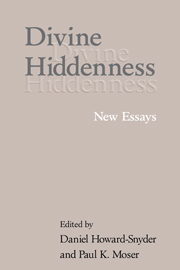Book contents
- Frontmatter
- Contents
- List of Contributors
- Introduction: The Hiddenness of God
- 1 What Is the Problem of the Hiddenness of God?
- 2 What the Hiddenness of God Reveals: A Collaborative Discussion
- 3 Deus Absconditus
- 4 St. John of the Cross and the Necessity of Divine Hiddenness
- 5 Jonathan Edwards and the Hiddenness of God
- 6 Cognitive Idolatry and Divine Hiding
- 7 Divine Hiddenness: What Is the Problem?
- 8 A Kierkegaardian View of Divine Hiddenness
- 9 The Hiddenness of God: A Puzzle or a Real Problem?
- 10 Seeking But Not Believing: Confessions of a Practicing Agnostic
- 11 The Silence of the God Who Speaks
- Bibliography
- Index of Names
- Index of Subjects
7 - Divine Hiddenness: What Is the Problem?
Published online by Cambridge University Press: 10 November 2009
- Frontmatter
- Contents
- List of Contributors
- Introduction: The Hiddenness of God
- 1 What Is the Problem of the Hiddenness of God?
- 2 What the Hiddenness of God Reveals: A Collaborative Discussion
- 3 Deus Absconditus
- 4 St. John of the Cross and the Necessity of Divine Hiddenness
- 5 Jonathan Edwards and the Hiddenness of God
- 6 Cognitive Idolatry and Divine Hiding
- 7 Divine Hiddenness: What Is the Problem?
- 8 A Kierkegaardian View of Divine Hiddenness
- 9 The Hiddenness of God: A Puzzle or a Real Problem?
- 10 Seeking But Not Believing: Confessions of a Practicing Agnostic
- 11 The Silence of the God Who Speaks
- Bibliography
- Index of Names
- Index of Subjects
Summary
The problem of evil centers on the claim that some evil is so bad that God would not allow it. If evil has such a character, it might be claimed that evil constitutes evidence against the existence of God. Even more, it might be held that evil constitutes an epistemic problem for theism, that the presence of evil has the power to alter the epistemic status of theism. For even if there are reasons which in themselves might confirm theism, factoring in the presence of evil might decrease the status of theism from, say, being rational to believe to being counterbalanced. Though not universal, this account of the epistemic implications of evil is widely shared, an account on which evil constitutes evidence with sufficient epistemic force to alter the epistemic status of theism. On this conception, then, evil constitutes an epistemic problem for theism.
This account of the nature of an epistemic problem for a point of view focuses on the concept of change (that some piece of information has the power to alter the epistemic status of that point of view), and that isn't quite right. The real issue is whether the new information has the power to make the epistemic status of a point of view different from what it would have been otherwise, different from what it would have been had that information not been present or available. Information can do the latter without ever changing the epistemic status of any point of view.
- Type
- Chapter
- Information
- Divine HiddennessNew Essays, pp. 149 - 163Publisher: Cambridge University PressPrint publication year: 2001
- 4
- Cited by

